Indian Contract Act, 1872
Indian Contract Act, 1872. Legality of Consideration and Object. S. 23 What considerations and objects are lawful, and what not. The consideration or object of an agreement is lawful, unless- 1 . It is forbidden by law; or
Share Presentation
Embed Code
Link
Download Presentation
- sexual relations
- fraudulent purpose
- control price
- indian contract act
- foreign law
- indian penal code

shanna + Follow
Download Presentation
Indian Contract Act, 1872
An Image/Link below is provided (as is) to download presentation Download Policy: Content on the Website is provided to you AS IS for your information and personal use and may not be sold / licensed / shared on other websites without getting consent from its author. Content is provided to you AS IS for your information and personal use only. Download presentation by click this link. While downloading, if for some reason you are not able to download a presentation, the publisher may have deleted the file from their server. During download, if you can't get a presentation, the file might be deleted by the publisher.
Presentation Transcript
- Indian Contract Act, 1872 Legality of Consideration and Object JMM KLELC
- S. 23 What considerations and objects are lawful, and what not The consideration or object of an agreement is lawful, unless- 1. It is forbidden by law; or 2. Is of such a nature that ,if permitted, it would defeat the provisions of any law; or 3. Is fraudulent; or 4. Involves and implies injury to the person or property of another; or 5. The court regards it as immoral, or opposed to public policy. In each of these cases, the consideration or object of an agreement is said to be unlawful. Every agreement of which the object or consideration is unlawful, is void. JMM KLELC
- Illustrations A agrees to sell his house to B for Rs. 10,000. Here B's promise to pay the sum of Rs. 10,000 is the consideration for A's promise to sell the house, and A's promise to sell the house is the consideration for B's promise to pay Rs. 10,000. These are lawful considerations. A promises to pay B 1,000 rupees at the end of six months, if C, who owes that sum to B, fails to pay it. B promises to grant time to C accordingly. Here the promise-of each party is the consideration for the promise of the other party. They are lawful considerations. JMM KLELC
- A promises, for a certain sum paid to him by B, to make good to B the value of his ship if it is wrecked on a certain voyage. Here A's promise is the consideration for B's payment and B's payment is the consideration for A's promise These are lawful considerations. A promises to maintain B's child and B promises to pay A 1,000 rupees yearly for the purpose. Here the promise of each party is the consideration for the promise of the 'other party. They are lawful considerations. JMM KLELC
- A, B and C enter into an agreement for the division among them of gains acquired, or to be acquired, by them by fraud. The agreement is void, as its object is unlawful. A promises to obtain for B an employment in the public service, and B promises to pay 1,000 rupees to A. The agreement is void, as the consideration for it is unlawful. JMM KLELC
- A, being agent for a landed proprietor, agrees for money, without the knowledge of his principal, to obtain for B a lease of land belonging to his principal. The agreement between A and B is void. as it implies a fraud by concealment, by A, on his principal. A promises B to drop a prosecution which he has instituted against B for robbery, and B promises to restore the value of the things taken. The agreement is void, as its object is unlawful. JMM KLELC
- A's estate is sold for arrears of revenue under the provisions of an Act of the Legislature, by which the defaulter is prohibited from purchasing, the estate. B, upon an understanding with A, becomes the purchaser, and agrees to convey the estate to A upon receiving from him the price which B has paid. The agreement is void, as it renders the transaction, in effect a purchase by the defaulter, and would so defeat the object of the law. JMM KLELC
- A, who is B's mukhtar, promises to exercise his influence, as such, with B in favour of C, and C promises to pay 1,000 rupees to A. The agreement is void, because it is immoral A agrees to let her daughter to hire to B for concubinage. The agreement is void, because it is immoral, though the letting may not be punishable under the Indian Penal Code. (45 of 1860.) JMM KLELC
- Analysis of S. 23 • Object or Consideration • The section covers legality of consideration and object as well. • Object and consideration sometimes may be different – both shall be lawful • Eg. loan for child marriage – consideration lawful but object unlawful -defeats the purpose of CMRA JMM KLELC
- JMM KLELC
- Forbidden by Law • Object of an agreement forbidden by law is void • ‘Law’ – law in force in India, personal laws unwritten principles of law • Eg. Sale of liquor without license is void & price irrecoverable • Eg. License to run liquor shop – sale, transfer, sub-lease of license or creation of partnership to run liquor shop – agreement of partnership void • Eg. An agreement to by goods (jaggery powder) above control price is void JMM KLELC
- Defeat the provision of any law • Object or consideration of an agreement is such that though it is not directly prohibited, if permitted, would defeat the provision of any law, such agreement is also void. • Sundersingh v. krishnasingh agreement by the accused with surety for providing security under Cr. P.C.– void • Agreement to defeat the law of a friendly country is also void • Foster v. Driscoll– Agreement to buy whisky in Great Britain & to smuggle it in to US • led to commission of offence in a foreign & friendly country – breach of international comity – hence void. JMM KLELC
- But innocent violation of municipal or foreign law which may not offend public conscience, may not make the agreement void Howard v. Shirlaster Container Transport Ltd Owner of an aircraft agreed with the pt for successfully removing his aircraft from Nigerian territorial airspace. Pt did so without permission of the Nigerian authorities and landed it in Ivory coast. The pt did so under the belief that there was imminent danger to lives in Nigeria. Pt sued for fees – Held: allowed to recover. Although court would not normally enforce a contract to enable a pt to benefit from his criminal conduct, because to do so, would offend public conscience. There are circumstances, it would be wrong to disqualify a person from recovering, even though his conduct constituted statutory offence. JMM KLELC
- Fraudulent • An agreement made for a fraudulent purpose to deceive third parties is void • Eg. Agreement with debtor and creditor that the creditor would get separate commission for inducing other creditors to enter into composition of their debts. • Eg. Two decree holders - Pt, decree holder with property attachment brought it to sale – agreed with the dt to buy for lesser price and then pay him a sum – property was knocked down to dt for a small price. Held, agreement void, it deprived the other decree holder of what he would have got if the sale had been competitive. JMM KLELC
- Injury to person or property • An agreement to injure the person or property of another is unlawful and void • Eg. A person barrowed a sum of Rs. 100 and agreed to serve pt for 2 yrs without pay and in case of default to pay the exorbitant interest and principal at once. Held, it involved slavery and unlawful and void • agreement to commit assault, hurt, defamation, etc • Eg. Agreement of insurance – insured committing suicide to help dependents • void. JMM KLELC
- Immoral • Agreement tainted immorality is not enforced • “Immorality” depends on standards of morality prevailing in a society at a given time and as approved by courts. • Instances of immorality- • Interference with marital relations • Eg. Money lent to a married woman to enable her to get divorce from her husband and promise to marry the lender • void • Promise to marry a woman after her husband’s death • void JMM KLELC
- Immoral Fender v. St. John – dt a married man told a nurse that he was unhappy with his wife and enquired whether she would marry him if his wife divorces him – she consented, sexual relations took place – dt’s wife secured decree of divorce on the ground of adultery – dt committed breach and married another HELD: pt was allowed to claim compensation – circumstances leading to mischief were absent hence not immoral. JMM KLELC
- 2. Dealings with Prostitutes • Always considered immoral • Eg. sale/hiring of goods to a prostitute for enabling her to carry on her business • void • Landlord knowingly letting his house for carrying on the business of prostitution • void JMM KLELC
- 3. Illegal cohabitation England – past consideration not valid – if promise in writing to pay for illegal cohabitation India – promise to pay for- Adulterous cohabitation, past/ present/future – void Future cohabitation – void Past cohabitation to secure it in future – void Past cohabitation only – valid JMM KLELC
- Opposed to public policy • An agreement is unlawful if the court regards its object or consideration as opposed to ‘publicpolicy’ • ‘publicpolicy’ – vague & unsatisfactory term. • TEST: “the twin touchstones of public policy are, • advancement of public good and • prevention of public mischief. These questions have to be decided by judges not as men of legal learning but as experienced and enlightened members of the community representing the highest common factor of public sentiment and intelligence” • Eg. Surrender of rights, sale of seats in public offices, etc. JMM KLELC
- JMM KLELC
- 1. Trading with an enemy Object of war is to cripple the commerce of enemy country A declaration of war imports prohibition of commercial intercourse and correspondence with the inhabitants of enemy country. Illegal except with the permission of the Crown. JMM KLELC
- 2. Trafficking in Public offices An agreement with a public officer to act corruptly is contrary to public policy. Agreement to provide money to a parliamentarian to influence his judgment sale of public offices in consideration of money . JMM KLELC
- JMM KLELC
- 4. Marriage brokerage contracts An agreement to procure marriage of a person in consideration of money – void Agreement for the sale of girl – void Attempt to make any material gain out of marriage is equally opposed public policy and void Gifts promised at the time of marriage – void JMM KLELC
- 5. Unfair and unreasonable dealings Where- • Parties economically are not on same footing • Unequal bargaining power • One in a position to exploit and the other is vulnerable • Bargain is apparently unfair • Opposed to public policy • Eg. Service contracts. JMM KLELC

THE INDIAN CONTRACT ACT 1872
2. Section 2 (h) defines a contract as ? an agreement enforceable by law" thus to make a contract there must be An agreement The agreement shall be enforceable by law.All agreements are not enforceable by law and therefore, all agreements are not contracts.. 3. Agreement . According to Sect
851 views • 47 slides
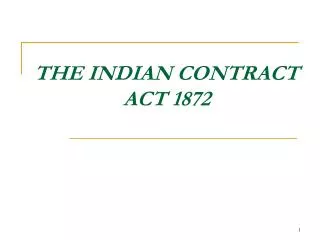
THE INDIAN CONTRACT ACT 1872
THE INDIAN CONTRACT ACT 1872. Section 2 (h) defines a contract as “ an agreement enforceable by law” thus to make a contract there must be An agreement The agreement shall be enforceable by law. All agreements are not enforceable by law and therefore, all agreements are not
1.66k views • 47 slides

Indian Removal Act
Indian Removal Act. Native American Reservations (2013). Native American reservations are some of the poorest areas in the United States. Casinos are one of the main money incomes for reservations.
362 views • 6 slides

Indian Contract Act 1872
Indian Contract Act 1872. The term “Contract” in ordinary sense means an agreement between two persons. The law of contract seeks to regulate the behavior of persons who make contracts, so that any conflict arises between these persons later may be resolved. Meaning of Contract:
888 views • 14 slides

INDIAN REMOVAL ACT
INDIAN REMOVAL ACT. Based on the current living conditions of the Americans and natives was the Indian Removal Act justified?. INDIAN REMOVAL ACT.
402 views • 9 slides

Indian Removal Act
Indian Removal Act. By: Brooks Wanamaker & Justin Phan. Facts May 18 th 1838 The united states was armed and plowed through all Cherokee towns moving all native Americans west. An army of looters followed behind them raiding all of the towns completely taking anything that has value to it.
416 views • 7 slides

Indian Contract Act 1872
Indian Contract Act 1872 Contract - Agreement between 2 or more persons which law will Enforce. Essentials: 2 or more parties Offer and Acceptance – one has to offer and other has to Accept Identity of Minds – Agreed upon the Subject Matter
1.21k views • 12 slides
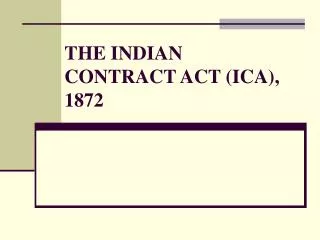
THE INDIAN CONTRACT ACT (ICA), 1872
THE INDIAN CONTRACT ACT (ICA), 1872. What is a contract?. Contract-Section 2(h) “An agreement enforceable by law is a contract”. Agreement-Section 2(e) “Every Promise and every set of promises forming consideration for each other”.
1.01k views • 24 slides
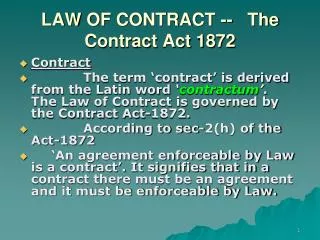
LAW OF CONTRACT -- The Contract Act 1872
LAW OF CONTRACT -- The Contract Act 1872. Contract The term ‘contract’ is derived from the Latin word ‘ contractum ’ . The Law of Contract is governed by the Contract Act-1872. According to sec-2(h) of the Act-1872
2.09k views • 26 slides
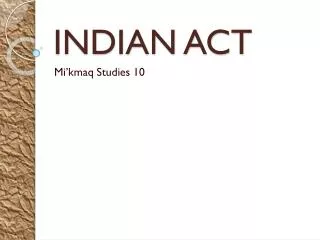
INDIAN ACT
INDIAN ACT. Mi’kmaq Studies 10. Indian Act. Passed in1876 Written in response to the “Indian problem” by the Canadian government Controversial treaty defining the relationship between the Canadian government and natives
504 views • 15 slides
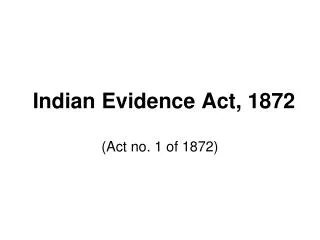
Indian Evidence Act, 1872
Indian Evidence Act, 1872. (Act no. 1 of 1872). The word ,evidence is derived from the Latin word evidens or evidere, which means “ to show clearly; to make clear to the sight; to discover clearly; to make plainly certain; to ascertain; to prove”.
1.24k views • 58 slides

THE INDIAN CONTRACT ACT 1872
THE INDIAN CONTRACT ACT 1872. Dr. Ravi Shekhar Vishal. Section 2 (h) defines a contract as “ an agreement enforceable by law” thus to make a contract there must be An agreement The agreement shall be enforceable by law. All agreements are not enforceable by law
716 views • 47 slides
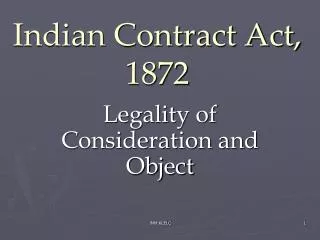
Indian Contract Act, 1872
Indian Contract Act, 1872. Legality of Consideration and Object. S. 23 What considerations and objects are lawful, and what not. The consideration or object of an agreement is lawful, unless- 1 . It is forbidden by law; or
631 views • 26 slides

INDIAN CONTRACT ACT
INDIAN CONTRACT ACT. NIREEKSHAN RAO :060125 SRIKANTH :060137. CONTRACT MANAGEMENT. CONTRACTS. THE WORD CONTRACT IS DERIVED FROM LATIN WORD ‘CONTRACTUM’ WHICH MEANS DRAWN TOGETHER;
714 views • 52 slides

Discuss the concept of free consent and misrepresentation as per the Indian Contract Act, 1872.
www.answersheets.in info.answersheets@gmail.com info@answersheets.in 91 95030-94040 Corporate Law 1."All contracts are agreements but all agreements are not contracts." Discuss this statement in light of the essential elements of a valid contract. Also mention briefly the different kinds of agreements under the India Contract Act, 1872. 2. Discuss, what are the rights, liabilities and disabilities of a minor as per the Indian Partnership Act, 1932. 3. What do you understand by implied warranties and conditions of sale according to the sale of Goods Act, 1930? 4. Differentiate between lay-off and retrenchment according to the Industrial Disputes Act, 1947. 5. Give the provisions related to safety as given in the Factories Act, 1948. 6. What are the characteristics or essential features of a company and briefly mention the types of companies. 7. What do you understand by electronic governance and what are the attributes of electronic records as mentioned in the Information Technology Act, 2000. 8. Discuss the concept of free consent and misrepresentation as per the Indian Contract Act, 1872. 9. Distinguish between private and public company. What are the special privileges of a private company over public company according to Companies Act, 1956? 10. Write short notes on any two of the following: (a) Cyber regulation (b) Industrial Dispute (c) Breach of Contact (d) Voidable contracts. www.answersheets.in info.answersheets@gmail.com info@answersheets.in 91 95030-94040
133 views • 5 slides
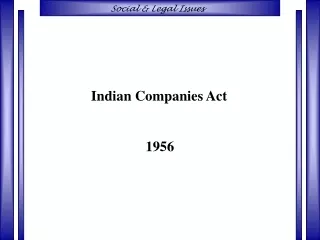
Indian Companies Act
Indian Companies Act. 1956. A company implies an association of persons for some common object(s). According to the act :A company formed and registered under the companies act 1956 or under any previous company law. A company is a contractual entity created by the members. Companies Act, 1956.
551 views • 52 slides

THE INDIAN CONTRACT ACT, 1872
THE INDIAN CONTRACT ACT, 1872. OFFER. OFFER. According to Sec.2(a), when a person made a proposal, when he signifies to another his willingness to do or to abstain from doing something. TYPES OF OFFER. Express offer Implied offer Specific offer General offer Cross offer Counter offer
2.44k views • 110 slides

THE INDIAN CONTRACT ACT, 1872
THE INDIAN CONTRACT ACT, 1872. CONTRACT.
1.52k views • 121 slides




















